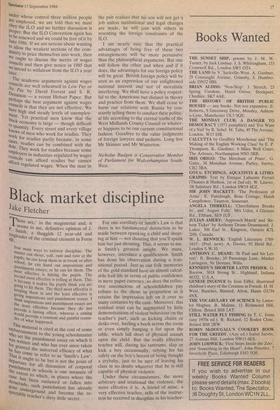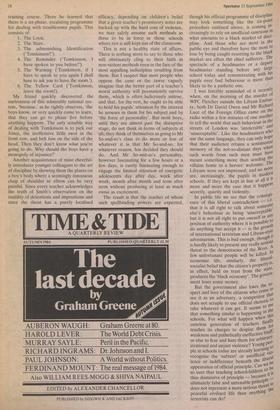Black market discipline
ake Fletcher
There are,' in the magisterial and, it seems to me, definitive opinion of J. Smith, a thuggish 12 year-old and nugleader of the criminal element in Form 413,
four main ways to enforce discipline. The Master can shout, yell, rant and rave at the Pupils; he can keep them in at break or after school; he can hand out impositions and Punishment essays; or he can hit them. The Most effective is hitting the pupils. The second most effective is yelling at them. This Is because it makes the pupils think you are
going to hit them. The third most effective is keeping Dying them in and the least effective is impositions and punishment essays. I think impositions and punishment essays are the least effective because they do not provide a lasting effect, whereas a caning Would Provide a constant and painful remin- der of what happened. This material is cited at the cost of some embarrassment to the young schoolmaster who set the punishment essay on which it ts written and who has ever since taken he granted the universal efficacy of what -r! haS come to refer to as 'Smith's Law'. 1,nat it ought to be but is not the point of departure for all discussion of corporal Punishment in schools is one measure of the extent to which, inplaces where the cane has been outlawed or fallen into u etude, such punishment has already gone underground and become the re- spectable teacher's dirty little secret.
For one corollary of Smith's Law is that there is no.fundamental distinction to be made between spanking a child and shout- ing at him — not shouting that you'll spank him but just shouting. This, it seems to me, is Smith's greatest insight. We must, however, introduce a qualification. Smith has done his observation during a tran- sitional period. Just as our folk memories of the gold standard have an almost calcul- able half-life in terms of public confidence in mere paper currency, so does the collec- tive unconscious of schoolchildren pay tribute to the shout in proportion as it retains the impression left on it over so many centuries by the cane. Moreover, this residual trust can be augmented by little demonstrations of violent behaviour on the teacher's part, such as kicking chairs or desks over, hurling a book across the room or even simply banging a fist upon the table, which fall short of physical assault upon the child. But the really effective teacher will, during his tantrums, slap or kick a boy occasionally, relying for his safety on the boy's horror of being thought a crybaby, just to be sure of leaving his class in no doubt whatever that he is still capable of physical violence.
Under these circumstances, the more arbitrary and irrational the violence, the more effective it is. A friend of mine, a very effective teacher, tells of the instruc- tion he received in discipline in his teacher-
training course. There he learned that there is a six-phase, escalating programme for dealing with troublesome pupils. This consists of: I. The Look.
2. The Stare.
3. The admonishing Identification ('Tomkinson?').
4. The Reminder (`Tomkinson, I have spoken to you before!').
5. The Warning ('Tomkinson, if I have to speak to you again I shall have to ask you to leave the room.').
6. The Yellow Card ('Tomkinson, leave the room!).
My friend quickly discovered the uselessness of this admirably rational sys- tem, 'because,' as he rightly observes, 'the boys know, or very quickly come to learn, that they can go to phase five before anything happens. The only sensible way of dealing with Tomkinson is to pick out Jones, the inoffensive little swot in the front row, and belt him on the side of the head. Then they don't know what you're going to do. Why should the boys have a monopoly of injustice?'
Another acquaintance of mine cheerful- ly introduces younger colleagues to the art of discipline by showing them the places on a boy's body where a seemingly innocuous clasp of shoulder or elbow can be very painful. Since every teacher acknowledges the truth of Smith's observation on the inutility of detentions and impositions and since the shout has a purely localised efficacy, depending on children's belief that a given teacher's promissory notes are backed up with the hard coin of violence, we may safely assume such methods as these to be in force in those , schools where riot is still kept out of the classroom.
This is not a healthy state of affairs. There is nothing more to say to those who will obstinately cling to their faith in non-violent methods even in the face of the most appalling indiscipline resulting from them. But I suspect that most people who oppose the cane or the tawse vaguely imagine that the better part of a teacher's moral authority will permanently survive them, which is often ludicrously untrue, and that, for the rest, he ought to be able to hold his pupils' attention by the interest he arouses in them for his subject and by 'the force of personality'. But most boys, until they are almost past the disruptive stage, do not think in terms of subjects at all; they think of themselves as going to Mr So-and-so's class to do more or less of whatever it is that Mr So-and-so, for whatever reason, has decided they should do. And Mr So-and-so's personality, however fascinating for a few hours or a few days, is rarely fascinating enough to engage the limited attention of energetic adolescents day after day, week after week, month after month and term after term without producing at least as much ennui as excitement.
The result is that the teacher of whom such spellbinding powers are expected, though his official programme of discipline may look something like the six-point
procedure outlined above, is coming In-
creasingly to rely on unofficial sanctions In what amounts to a black market of disci- pline. And those who are most in the public eye and therefore have the most to lose by being caught resorting to the black market are often the chief sufferers. The spectacle of a headmaster or a deputy headmaster standing before any large school today and remonstrating with his pupils over bad behaviour is more than likely to be a pathetic one. I was forcibly reminded of it recently when, on the morning of the murder of WPC Fletcher outside the Libyan Embas- sy, both Dr David Owen and Mr Richard Luce of the Foreign Office came on the radio within a few minutes of one another
to tell the world that such behaviour in the streets of London was 'intolerable' and
`unacceptable'. Like the headmasters who
use the same language, they can only hope that their audience retains a sentimental memory of the not-so-distant days when
such words from such men must have meant something more than sending the
villains home to a heroes' welcome. The Libyans were not impressed; and no more are, increasingly, the pupils in modern schools. If they are kept in line at all it Is more and more the case that it happens secretly, quietly and violently. In public life we see that the consequ- ence of this liberal contradiction — i.e' that it is all right to talk about someone, else's behaviour as being 'unacceptable
but it is not all right to put oneself in any position of authority where it is possible to do anything but accept it — is the growth
of international terrorism and Libyan-style adventurism. This is bad enough, though it
is hardly likely to present any really serious threat to the democracies of the West. few unfortunate people will be killed. In economic life, similarly, the liberal- socialist belief that the citizen's propertY in effect, held on trust from the state, produces the 'black economy'. The govern- ment loses some money. But the government also loses the re" spect and love of the citizens who come I°, see it as an adversary, a competitor thin does not scruple to use official rhetoric to take whatever it can get. It seems to rrl, that something similar is happening In
schools. For what will happen when this caneless generation of teachers finally teaches its charges to despise them
weakness and pathetically ineffective bluii, or else to fear and hate them for arbitrarY,
irrational and unjust violence? Young Peo- ple in schools today are already learningtu.. recognise the 'subtext' or unofficial vi°, lence or indifference beneath the libera appearance of official principle. Can we 113, so sure that teaching schoolchildren to be thus dismissive of principle — because it Is ultimately false and untenable principle does not represent a more serious threat to peaceful civilised life than anything the terrorists can do?



















































 Previous page
Previous page